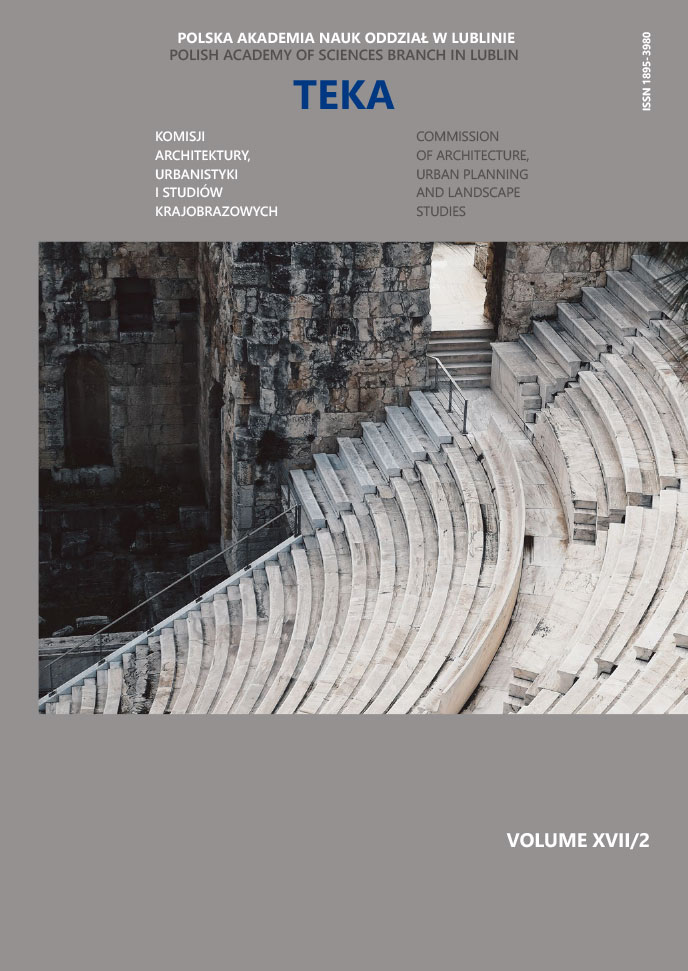The technology that meets modern human needs – criteria of assessment of smart home system
Article Sidebar
Issue Vol. 17 No. 2 (2021)
-
Retrospection: genesis and durability of post‑war polychromes of tenement houses in the Old Market Square in Poznań
Andrzej Łubowski7-16
-
The importance of creating a cultural park within the historical center of Zamość. Good practices. The cultural park is not the Zamość Park
Katarzyna Kielin17-23
-
Flat pneumatic elements and their potential use in the construction of dwelling facilities within emergency housing systems
Witold Szymański24-36
-
The technology that meets modern human needs – criteria of assessment of smart home system
Dariusz Gaweł37-44
-
Use and functioning of the castle ruins in Iłża
Katarzyna Drobek, Maciej Trochonowicz45-54
-
Criteria of livable public spaces quality. Case study analysis on the example of selected public spaces Lublin, Poland
Agnieszka Chęć-Małyszek55-75
-
Voice in the discussion about the original architecture of the Powder Tower and the 16th century third defensive line in the Lviv Middletown
Mykola Bevz76-86
-
Building engineering issues in Architectural education in Poland, in context of actual Ministry of Science and Higher Education Regulations
Zuzanna Napieralska, Marek Piróg, Natalia Przesmycka, Agata Pięt, Marcin Zdanowicz87-95
Archives
-
Vol. 19 No. 2
2023-12-29 11
-
Vol. 19 No. 1
2023-12-19 13
-
Vol. 18 No. 4
2022-12-30 5
-
Vol. 18 No. 3
2022-12-27 5
-
Vol. 18 No. 2
2022-12-27 5
-
Vol. 18 No. 1
2022-12-27 4
-
Vol. 17 No. 4
2021-12-30 11
-
Vol. 17 No. 3
2021-12-30 9
-
Vol. 17 No. 2
2021-12-30 8
-
Vol. 17 No. 1
2021-12-30 8
-
Vol. 16 No. 4
2020-12-30 11
-
Vol. 16 No. 3
2020-09-30 10
-
Vol. 16 No. 2
2020-06-30 11
-
Vol. 16 No. 1
2020-03-31 10
-
Vol. 15 No. 4
2019-12-30 6
-
Vol. 15 No. 3
2019-10-31 9
-
Vol. 15 No. 2
2019-06-28 12
-
Vol. 15 No. 1
2019-03-29 13
Main Article Content
DOI
Authors
Abstract
The article is a summary of the research conducted for educational purposes with the participation of students from the University of Technology in Lublin in Poland, on the design and use of facilities created as smart home (SH). The increasing availability of smart building equipment systems is associated with their widespread use and reasonable price. New technologies, which are the result of scientific and technological progress, make it possible to use the devices to raise the standard of habitation and use of buildings. The creation of SH facilities nowadays is not only limited to single-family buildings. More and more often we observe smart multi-family and public utility buildings. At the same time, we are aware of the design of energy self-sufficient facilities, which allow us the freedom to build in undeveloped areas.
Keywords:
References
Bergeron F., Bouchard K., Gaboury S., Giroux S., Tracking objects within a smart home, Expert Systems With Applications, 113, 428−442, 2018. DOI: https://doi.org/10.1016/j.eswa.2018.07.009
Bin Zhou, Wentao Li, Ka Wing Chan, Yijia Cao, Yonghong Kuang, Xi Liu, Xiong Wang, Smart home energy management systems: Concept, configurations, and scheduling strategies, Renewable and Sustainable Energy Reviews, 61, 30−40, 2016. DOI: https://doi.org/10.1016/j.rser.2016.03.047
Careglio D., Fiore U., Ricciardi S., Sembroiz D., Planning and operational energy optimization solutions for smart buildings, Information Sciences, 476, 439−452, 2019. DOI: https://doi.org/10.1016/j.ins.2018.06.003
Cook D.J., De la Cruz G., Goel S., Minor B., Nesaei S., Pereyda C., Raghunath N., Schmitter-Edgecombe M., Wilson G., Robot-enabled support of daily activities in smart home environments, Cognitive Systems Research 2018.
Darby S.J., Gram-Hanssen K., “Home is where the smart is”? Evaluating smart home research and approaches against the concept of home, Energy Research & Social Science, 37, 94−101, 2018. DOI: https://doi.org/10.1016/j.erss.2017.09.037
Ford R.,Karlin B.,Pritoni M.,Sanguinetti A., Categories and functionality of smart home technology for energy management, Building and Environment, 123, 543−554, 2017. DOI: https://doi.org/10.1016/j.buildenv.2017.07.020
Kumard P., Mazaheric M., Morawska L., Salthammer L.C., Salthammer T., Schiewecka A., Uhdea E., Smart homes and the control of indoor air quality, Renewable and Sustainable Energy Reviews, 94, 705−718, 2018. DOI: https://doi.org/10.1016/j.rser.2018.05.057
Lyanage C. De Silva, Morikawa C., Petra I.M., State of the art of smart homes, Engineering Applications of Artificial Intelligence, 25, 7,1313−1321, Elsevier 2012. DOI: https://doi.org/10.1016/j.engappai.2012.05.002
Mikulik J., Budynek inteligentny. Podstawowe systemy bezpieczeństwa w budynkach inteligentnych, vol 2, Wydawnictwo Politechniki Śląskiej, Gliwice 2010 (in Polish).
Min Li, Wenbin Gu, Wei Chen, Yeshen He, Yannian Wu, Yiying Zhang, Smart Home: Architecture, Technologies and Systems, Procedia Computer Science, 131, 393−400, 2018. DOI: https://doi.org/10.1016/j.procs.2018.04.219
Niezabitowska E., Metody i techniki badawcze w architekturze, Wydawnictwo Politechniki Śląskiej, Gliwice (2015) (in Polish).
Suriya Priya R. Asaithambi, Sitalakshmi V., Ramanathan V., Big Data and Personalisation for Non-Intrusive Smart Home Automation, MDPI Journal, 5, 6, 1−21, 2021. DOI: https://doi.org/10.3390/bdcc5010006
Tookey J., Omrani H., Fleury A., Naismith N., Ghaffarianhoseini M., Gaffarianhoseini A., Future of Smart Homes: Application of Intelligent Technologies towards Smaler Urban Future, IGI Global 2016.
City of 2030 survey by Cite Research – November 2018 (2019), 30 July 2021, https://www.plastech.pl/wiadomosci/Urzadzenia-Smart-Home-beda-standardem-do-2030-roku-14192.
Article Details
Abstract views: 260
License

This work is licensed under a Creative Commons Attribution-ShareAlike 4.0 International License.


